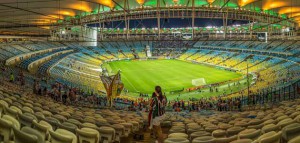Two nations now have the uncommon fortune of consecutively hosting the FIFA World Cup and the Olympic Games: Russia, and Brazil. This article will focus on Brazil, which saw the Brazilian people taking to the streets, exercising their right to protest corruption; in response, the Brazilian legislature has enacted substantial new anti-corruption laws; and enforcement agencies have mounted credible enforcement actions against both the government and business sectors.
 In this, the window between these mega events, eight hand-picked students and I formed a team to research the application of Brazil’s new anti-corruption regime to the Rio 2016 Olympics. We’d spent the better part of a year conducting academic research and otherwise studying the issue from afar. Then in March, we traveled to Brazil, interviewing lawyers, businesspeople, government officials, NGOs, and academics. We found an anti-corruption story far more nuanced, complex, and compelling than the outside world may now understand. So too did we find critical unanswered questions that go to the very heart of Brazil’s anti-corruption movement.
In this, the window between these mega events, eight hand-picked students and I formed a team to research the application of Brazil’s new anti-corruption regime to the Rio 2016 Olympics. We’d spent the better part of a year conducting academic research and otherwise studying the issue from afar. Then in March, we traveled to Brazil, interviewing lawyers, businesspeople, government officials, NGOs, and academics. We found an anti-corruption story far more nuanced, complex, and compelling than the outside world may now understand. So too did we find critical unanswered questions that go to the very heart of Brazil’s anti-corruption movement.
We knew, for example, that Brazil had modified its procurement regime to meet the demands of World Cup and Olympics preparation. It streamlined the bidding process, seemingly raising a red flag. What we did not know is that prior to and independent of these sporting events, Brazil had encountered significant problems with its procurement process that resulted in the misalignment of interests among contractors, delays and cost overruns, and endless litigation. The streamlined procurement regime, then, was not (or at least, not purely) a deliberate bypass of corruption prevention measures. Rather, the World Cup and Olympics became a catalyst to experiment with an alternative procurement regime. Is the new regime working? Has it addressed the inefficiencies of the prior system without creating undue corruption risk? We continue to seek answers.
We also knew that the Brazilian enforcement authorities had prosecuted and sanctioned very little corruption in relation to the World Cup. Again, this would seem a red flag. But what we discovered in our interviews is that Brazil has designed a corruption prevention strategy that does not rely on criminal prosecution. Rather, Brazil is focusing principally on preventative auditing by its Tribunal de Contas da União (TCU), a federal body with authority to audit federal contracts. And we know that the TCU is reviewing Olympic contracts with a newfound rigor. Will this system work? Can Brazil effectively reduce corruption through preventative auditing, without relying on aggressive criminal or civil prosecution? We are evaluating these and many other anti-corruption issues.
In one of our final interviews, the acting president of the Public Olympic Authority, Marcelo Pedroso, made a plea. He said too much of the world knows Brazil only for its futbol, samba, and Carnival, but the country is so much more. Brazil is a young democracy, with an emerging economy, and a robust, though nascent, anti-corruption regime. He said that the Olympics, even more so than the World Cup, are Brazil’s chance to showcase to the world its commitment to good governance. Our team will be writing a longer article for this blog, also to be published in Transparency International’s upcoming anthology, and then a major law review article next year. We’ll document how far Brazilian anti-corruption reforms have come, and how far they may have yet to go.















 Connect with us on Facebook
Connect with us on Facebook Follow us on Twitter
Follow us on Twitter